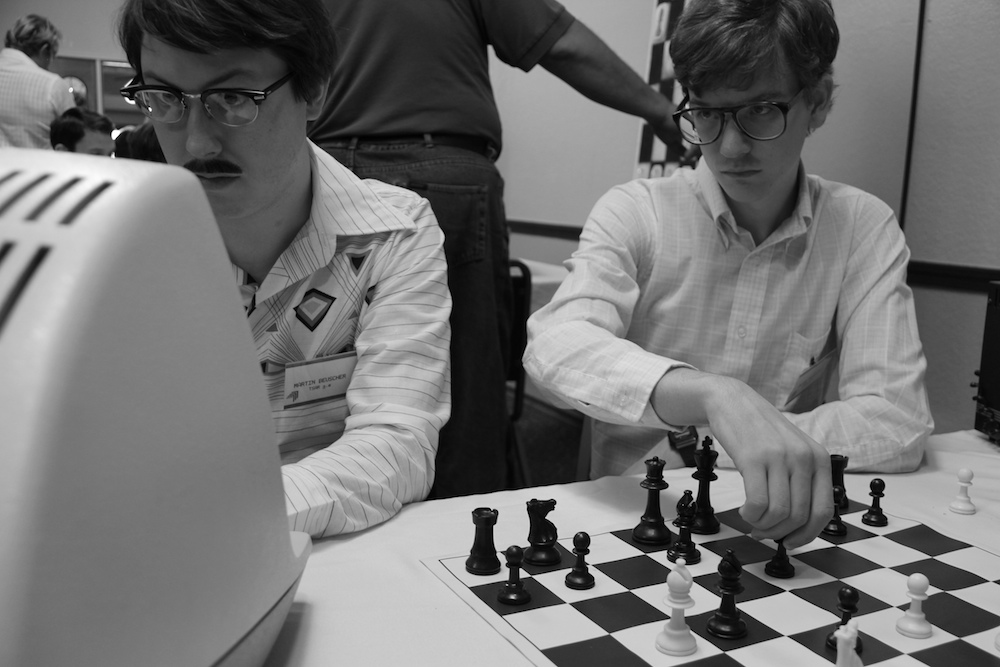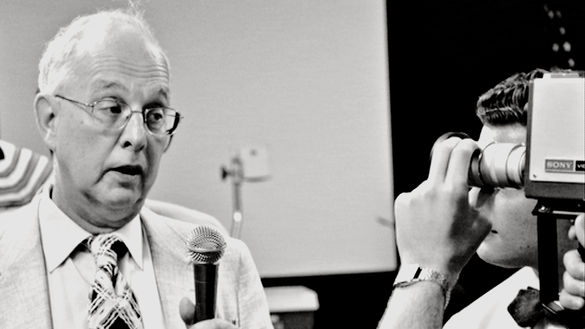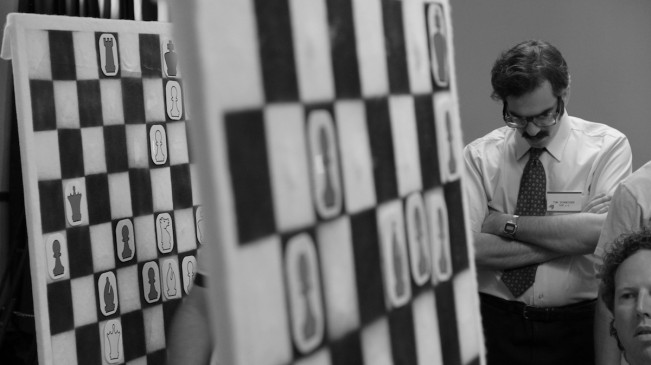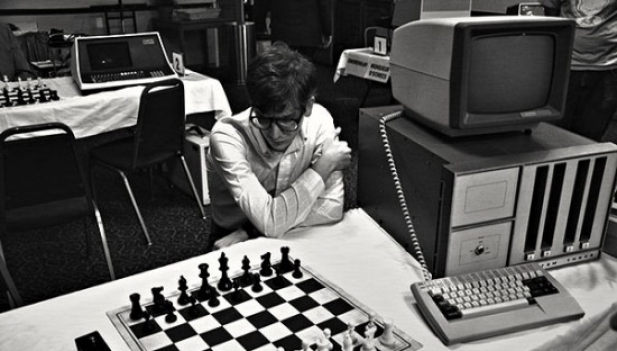This review originally published here.
Ever since I saw it at SXSW this year, I’ve had trouble comparing Andrew Bujalski’s Computer Chess to other things that I’ve seen. I’ve read and heard others compare it to Kubrick, Cronenberg, and Carruth. While I agree that it shares spiritual DNA with some of the flavors, themes, and cerebral complexity of those directors’s work (most notably 2001, ExistenZ, Videodrome, and Primer), Computer Chess is its own sort of sentient cinematic intelligence.
I the interest of full disclosure, I’m friends with two of the actors in the movie, Wiley Wiggins and Daniel Metz. I also helped organize a screening of the movie during this year’s Apple Worldwide Developer’s Conference (WWDC), too. I didn’t do the latter because of the former, but rather, because Computer Chess struck me as the movie most perfectly made for the hardest core nerds among us.

Martin Beuscher (Wiley Wiggins) l., and Peter Bishton (Patrick Reister) r.
The movie is set in the early 1980’s at a computer chess programming competition, at a time before computers could beat humans at chess. Attending are a host of interesting players, including self-absorbed chessmaster Pat Henderson (film critic and filmmaker Gerald Peary), ne’er-do-well coder Michael Papageorge (Myles Page), and various programmers, including promising upstart Peter Bishton (Patrick Reister) and one of his mentors, Martin Beuscher (Wiley Wiggins).
Each team pits their programs against one another in a bracketed tournament. The winning program then has the “honor” of facing chessmaster Henderson. After the initial setup, which beautifully captures the awkward, stilted dorkiness of programming conferences in the pre-“brogrammer” era, we drift from following one person, group, or another throughout the weekend event. Most of the time, we follow Peter.

The magnificent Gerald Peary as Pat Henderson
At one point, a couples spiritual group starts meeting in the same space as the conference, but during off hours. Only one woman is attending the conference, which is disruptive enough for that side of things, but the drinking, drugs, and hyper-ambitious programmers themselves make for an interesting cocktail on their own. At one point, one of the programs begins exhibiting an unpredictable behavior: it appears to make a concerted effort to lose, but only when it is playing against another program. This begins the process of examining not only the concept of artificial intelligence itself, but how “nature versus nurture” comes into play as we theoretically approach the singularity.
Lewis Carroll’s Alice in Wonderland is the influence I haven’t seen oft-cited, but which I recognized, whether conscious or not on Bujalski’s part. The entire narrative is an exploration of the nature and future of artificial intelligence, but it is just as much a journey down a rabbit hole, complete with an ominous cat as an ever-present monitor to the proceedings. There are a couple of really great payoffs toward the end that I didn’t see coming. Even had they not come through, I was fine with the “clean code” represented by the meditative, contemplative feature otherwise represented. By the end, you could call Computer Chess an exercise in science fiction, but my perspective holds that you could say that from the opening scene.

The look is another part of the movie’s charm. They used period-appropriate, tube-based camera equipment retrofitted to record to digital media. Various films over the years have used black and white simply as a color palette choice meant to evoke “old”, or a particular moment in time, with mixed and usually lousy results. Computer Chess excels thanks to the layer of age, imperfection, and retrospectively, the feeling of a lack of sophistication that the aesthetic generates. Instead of it being a computer effect, a video filter, or anything else. It is just as analog as it feels the movie should look. Though it’s much-maligned for various reasons, Soderbergh achieved a similar miraculous effect using vintage lenses and equipment on The Good German.

Narratively, Bujalski greatly benefits from virtually the entire cinematic canon covering this period in computing history being riddled with inaccurate dialogue, “Hollywoodized” real-life situations, and an attempt to “sex up” or unfairly dorkify computer nerds in a way that doesn’t ring true. Whether Pirates of Silicon Valley or the soon-to-release Jobs, among others, the origins of personal computing on film have always felt too forced, too eager to please, or too interested in being something else in nerd’s clothing. Computer Chess allows nerds to be nerds, weirdos to be weirdos, and is content to spy on the moments worth watching, contemplating, and questioning.
Whenever the last time it was that Soderbergh said people don’t go the to movies to be compelled, challenged, or have their minds provoked anymore? This is exactly the kind of compelling, challenging, and provocative movie that, as a result, is in danger of extinction.
The Wolverine is good, but it’ll be easy to find in your town a week from now. Computer Chess might only be booked for a week or less once it debuts in a particular city.
Computer Chess began its limited release in NYC at the Film Forum a week ago, and plays there until 7/31.
For a full list of playdates, check this page, where you can sort by date, city, state/province, and theater, should you choose. On the day I write this (7/26), it begins one week runs in the following cities:
Boston, MA
Toronto, ON
Seattle, WA
Berkeley, CA
Atlanta, GA
Philadelphia, PA
If any friends in Tallahassee (where Moriarty and I went to college!) read this, it is playing one day only at All Saints Cinema on August 1st.
Moisés Chiullan / "Monty Cristo"
@moiseschiu
email
Arthouse Cowboy
Screen Time (movies/media) podcast
Giant Size (comics) podcast
